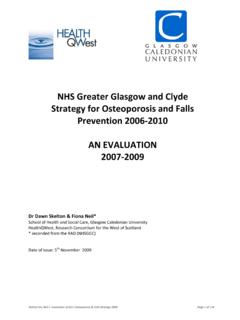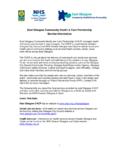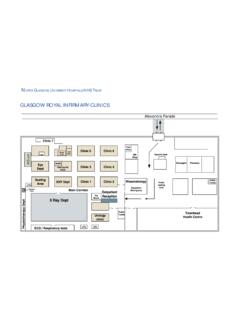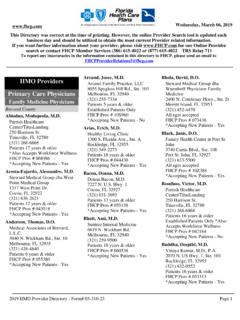Transcription of STANDARDS FRAMEWORK for Counsellors & Counselling …
1 STANDARDS FRAMEWORK . for Counsellors &. Counselling services In the Primary Care Division June 2005. STANDARDS FRAMEWORK for Counsellors & Counselling services contents INTRODUCTION 2. EXECUTIVE SUMMARY 2. A. STANDARDS FOR Counsellors AND Counselling 2. B. GUIDELINES FOR WAYS OF WORKING 4. STANDARDS 5. 1. Definitions of Counsellor' and Counselling Skills' in the Division 5. The Complexity of the Role 5. A Counsellor in the Division 5. Counselling Skills 6. 2. Minimum STANDARDS for Training, Accreditation, Continuous Professional Development, Supervision and Management 6. Training 6. Accreditation 7. Continuing Professional Development (CPD) 7. Supervision 8. Supervisors 8. Management 8. 3. Competencies for a Counsellor in the Division 9. 4. Proposed Career Structure 9. 5. Record Keeping and Confidentiality 11. 6. Roles of Counsellors as Supervisors, Advisers and Trainers 11. Supervisors 11. Advisers 11. Trainers 11.
2 7. 8. Student, Trainee and Volunteer Placements Commissioning Counselling services 11. 12. 1. 9. Consistency of Information about Counselling services 12. 10. Codes of Practice/Ethics for Counselling in the Division 13. Appendix 1: GUIDANCE NOTES ON WAYS OF WORKING 14. 1. Continuing Professional Development (CPD) 14. 2. Supervision and Supervisors 14. 3. Management 15. 4. Record keeping and Confidentiality 16. 5. Referrals 16. 6. Caseload 16. 7. Student and Volunteer Placements 17. 8. Team Work 17. 9. Professional Relationships 17. 10. Commissioning Counselling services 18. 11. Consistency of Information about Counselling services 18. 12. Codes of Practice/Ethics for Counselling in the Division 18. Appendix 2: Accredited and Validated Diploma Courses 19. Appendix 3: NHS Counsellor - Agenda for Change Information 21. Appendix 4: Further Information on Professional Bodies 25. Appendix 5: Working Group - Remit and Membership 26.
3 STANDARDS FRAMEWORK for Counsellors & Counselling services introduction If Counselling is to be one of the recognised interventions for promoting mental health and well- being to the public, then regulation, standardisation and consistency in practice are required.. (Sharman, Seber)1 (The Faculty of Healthcare Counsellors and Psychotherapists, January 2004). Counselling services play a significant role across an increasingly wide range of services within NHS Greater Glasgow. In recognition of the fact that at present Counselling is not regulated by statute and there is no statutory governance over the term counsellor', a multi-disciplinary Working Group was tasked to develop a STANDARDS FRAMEWORK to include everyone employed as Counsellors and the Counselling services they provide in the Primary Care Division. The draft STANDARDS and Guidelines were subject to an extensive consultation exercise and revised based on the comments received.
4 The final 17 STANDARDS and 12 underpinning Guidelines in this FRAMEWORK are intended to benefit clients, Counsellors and NHS Greater Glasgow by providing a structured, consistent and quality assured FRAMEWORK . It is intended that the STANDARDS and Guidelines are reviewed one year from now in order to assess the extent to which they have been achieved. This will also provide an indication of potential other areas to be included in a future update of the STANDARDS FRAMEWORK . This document draws extensively on the publication, Guidance for Best Practice: the employment of Counsellors and psychotherapists in the NHS (January, 2004), by the British Association of Counsellors and Psychotherapists (BACP) and its division, the Faculty of Healthcare Counsellors & Psychotherapists (FHCP). We thank them for their kind permission to use their material. 2 Finally, I would like to express my gratitude to the members of the Working Group for developing the STANDARDS FRAMEWORK for the Division.
5 Dr Iain Wallace Medical Director June 2005. executive summary This STANDARDS FRAMEWORK for Counsellors and Counselling services in the Primary Care Division contains 17 STANDARDS and 12 Guidelines. These are summarised below: A. STANDARDS FOR Counsellors AND Counselling . 1. A counsellor in the Primary Care Division is a prescribed role with a protected title which should only be used by people with appropriate training and qualifications. 2. People employed by the Division who hold only a Counselling skills qualification may not call themselves Counsellors and should not be referred to by others as Counsellors . 3. All Counsellors employed in the Division must have a diploma in Counselling . Both the diploma and the awarding institute must be accredited or validated at this level by either BACP or COSCA. STANDARDS FRAMEWORK for Counsellors & Counselling services 4. All newly appointed Counsellors in the Division to work towards accreditation within five years of qualifying.
6 All current Counsellors who are not accredited are to agree a timescale with their manager in which they will achieve accreditation. This should be no longer than three years from the date of the discussion and progress should be recorded in an annual Personal Development Plan. 5. All Counsellors in the Division to have access to appropriate Continuing Professional Development opportunities which are recorded in an annual Personal Development Plan (PDP). The annual PDP will be an opportunity for Counsellors to review their practice and development needs with an appropriate manager. 6. Identified time for supervision to be part of the terms and conditions of all Counsellors in the Division. As a minimum, this should be one and a half hours of individual supervision per month, within working hours (or individual equivalent in group supervision) for a full-time counsellor. 7. Supervisors should have a qualification in Counselling supervision, or be accredited as a supervisor, and have an understanding of working in the NHS.
7 They will also have a formal, written contact with the NHS. 8. Counsellors within the Division to have an identified operational line manager and access to professional support. Counsellors to work within their code of professional practice and be accountable for their clinical work to the Team Leader. 9. There should be defined competencies for all levels of Counsellors working within the Division. It is recommended that the Division develops competencies for Counsellors , based on the current work under Agenda for Change. 10. The Division to adopt an agreed structure (one is proposed) for professional development and career progression for Counsellors employed in the Division. 3. 11. Counsellors to adhere to STANDARDS of record keeping as prescribed by the Division. These will be appropriate to the needs of the service setting and consistent with records kept by similar professions in that setting, including matters of access to these records.
8 12. Counsellors to be bound by the NHS STANDARDS and guidelines on confidentiality, in addition to the codes of good practice produced by the Counselling professional bodies. 13. Suitably qualified Counsellors should be given opportunities to develop their skills as supervisors, advisers and trainers. 14. The Division to have a structured and standardised approach to placements (including clear accountabilities). 15. The Division to apply the STANDARDS in this FRAMEWORK when commissioning Counselling services both from within the NHS and from external organisations. 16. There should be consistency in the information provided about Counselling services within the Division. 17. The Division to recognise the BACP and COSCA ethical frameworks and codes of practice. As members of professional bodies, Counsellors in the Division must adhere to those codes and frameworks. Counsellors must also adhere to Divisional procedures for ethical practice.
9 STANDARDS FRAMEWORK for Counsellors & Counselling services B. GUIDELINES FOR WAYS OF WORKING. I. It is the responsibility of the counsellor and the operational line manager to address Continuing Professional Development requests within the context of the counsellor's accreditation requirements, their contracted hours and service delivery needs. II. It is the responsibility of the counsellor and the operational line manager to address supervision requirements within the context of the counsellor's workload, their contracted hours and service delivery needs. III. Clear lines of accountability and responsibility for supervisors of Counsellors will be developed by the Division. They will be included in all formal, written contracts between the supervisor(s) and the NHS. IV. Counsellors within the Division to have an operational line manager and a professional manager. A working group to be set up to investigate how the professional links can be structured in the Division.
10 V. All referral processes should note a reason for referral and anticipated benefits of referrals. VI. The caseload for a counsellor to be split 60:40, with direct, face to face Counselling hours as 60 per cent of the counsellor's time and other activities as 40 per cent. In general, caseload should not exceed 20 clients per week. Client work can vary from a brief intervention model or longer term work, depending on the Counselling location in primary care. Caseloads should be monitored through the guideline on supervision. It will be the responsibility of local managers to work with Counsellors to ensure this is achievable for both Counsellors and their clients. 4 VII. The Division to carry out further work with the professional bodies and the training providers to agree a standardised approach to student placements. VIII. All Counsellors to work within the principles and guidelines for working in multi- disciplinary teams as set out by the professional bodies and the Division.













